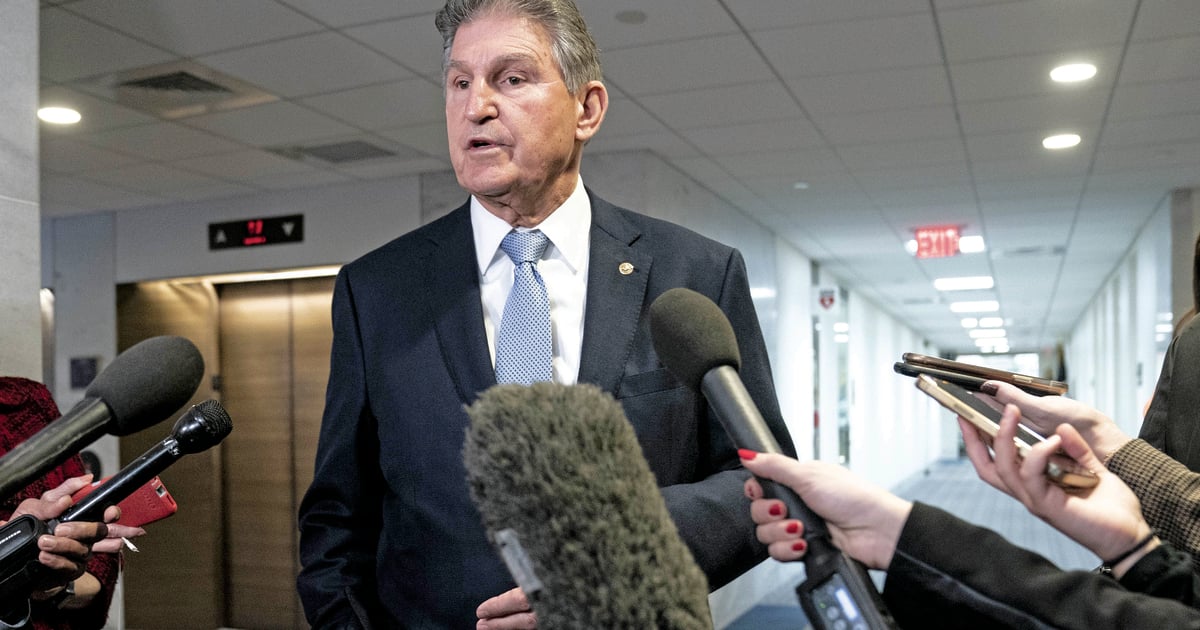
WASHINGTON — Sen. Joe Manchin, D-W.Va., plans to introduce a bill Wednesday that would direct the U.S. Treasury Department to immediately stop issuing $7,500 consumer tax credits for electric vehicles that do not meet strict critical mineral and battery component requirements.
The bill — titled the American Vehicle Security Act — would amend the Inflation Reduction Act so that the effective date of the required EV battery sourcing is no longer tied to Treasury’s release of proposed guidance on the restrictions.
If enacted, no credit would be available to any new EV that does not meet the critical mineral and battery sourcing requirements, effective retroactively as of Jan. 1.
A Democratic committee aide on Tuesday told Automotive News the bill did not yet have bipartisan support or co-sponsors because it had not been shared outside internal discussions. It also had not been shared with any auto industry representatives, the aide said.
Treasury is planning to issue proposed guidance on the consumer tax credit’s critical mineral and battery component requirements in March after missing its year-end deadline in 2022. It also will issue a proposed rule-making that further clarifies key provisions already in play, such as price caps and how vehicles are classified.
While Treasury’s delay potentially opens up more vehicles to qualify for the $7,500 credit, it has left dealers, automakers and consumers with an incomplete rulebook for navigating the complex federal tax incentives for at least a two-month period.
Once Treasury issues the proposed guidance, the $7,500 tax credit for new EVs, known as 30D, will be parceled out in two halves for qualifying vehicles and buyers. Half is based on meeting escalating requirements for battery components to come from North America, with none from “foreign entities of concern” as soon as 2024. The other half is based on critical minerals coming from the U.S. or free-trade partners with no “entity of concern” sourcing from 2025.
For critical minerals, the law states that before 2024 and after Treasury issues the proposed guidance on the required EV battery sourcing, 40 percent must be extracted or processed in the U.S. or in a country where the U.S. has a free-trade agreement in effect, or from materials that were recycled in North America. By 2027, the law requires 80 percent.
For battery components, the law states that before 2024 and after Treasury issues the proposed guidance, 50 percent must be made or assembled in North America. By 2029, the law requires 100 percent.
The 30D credit also requires qualifying vehicles to be assembled in North America and sets limits on sticker price and buyer income. The stipulations are designed to incentivize domestic EV production, reduce reliance on Chinese and other foreign supply chains and prevent wealthy buyers from getting a discount.
In a statement Wednesday, Manchin said it was “unacceptable” that Treasury has not yet issued the proposed guidance but continues to make the full $7,500 credit available.
The Inflation Reduction Act “is first-and-foremost an energy security bill, and the EV tax credits were designed to grow domestic manufacturing and reduce our reliance on foreign supply chains for the critical minerals needed to produce EV batteries,” he said.
Nearly 40 new models are potentially eligible for the full $7,500 tax credit between Jan. 1 and until Treasury issues the required EV battery sourcing guidance, according to an IRS list. However, under Manchin’s bill, eligibility would be significantly limited during that time frame, with very few to no vehicles likely qualifying for the critical minerals portion of the credit, the aide said.
The Alliance for Automotive Innovation, an industry trade group that represents most major automakers and other auto companies in the U.S., also has said no vehicles would be eligible for the full credit once the EV battery sourcing rules take effect.
Manchin, who chairs the Energy and Natural Resources Committee, has previously questioned the need for EV incentives. His bill would ensure U.S. reliance on foreign supply chains would be addressed without further delay, the aide said.
The senator’s legislative action also comes after Treasury issued preliminary guidance further clarifying that EVs leased by consumers could qualify for the commercial clean vehicle credit, known as 45W, which is not subject to the same eligibility restrictions as the 30D credit.
The 45W credit is limited to $7,500 for vehicles weighing less than 14,000 pounds, and $40,000 for all other vehicles. While the credit does not transfer directly to the consumer or lessee, it could be used by the lessor, or leasing entity, to lower lease prices.
In a statement last month, Manchin blasted Treasury’s guidance and urged a pause on the consumer and commercial credits, stating the interpretation “bends to the desires of the companies looking for loopholes and is clearly inconsistent with the intent of the law.”
Treasury has maintained it is following the tax laws and the Inflation Reduction Act as written.
Manchin had previously asked Treasury to follow “congressional intent” and release guidance ensuring the commercial EV tax credit cannot be applied to vehicles that are leased, rented or used for ride-hailing purposes.
The senator pointed to public comments submitted by some automakers and foreign governments that asked for a broad interpretation of the commercial EV tax credit that would allow rental cars, leased vehicles and ride-hailing vehicles such as those used by Uber and Lyft to qualify.
If allowed, Manchin argued, companies could then effectively bypass sourcing and assembly requirements in the consumer tax credit.
“Instead of trying to find loopholes within these credits, domestic automakers should be seizing the opportunity to solidify our country’s role as the automotive superpower we can and should be,” the senator said in a letter to Treasury.